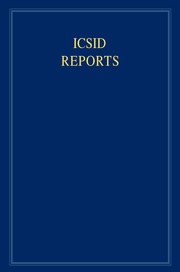No CrossRef data available.
Article contents
Tethyan Copper Company Pty Limited v. Islamic Republic of Pakistan
Published online by Cambridge University Press: 06 July 2022
Abstract
Procedure – Preliminary objections – Time limits – Special circumstances – ICSID Arbitration Rules, Rule 41 – ICSID Arbitration Rules, Rule 26(3) – Whether there were special circumstances for the State’s new evidence of alleged corruption to be considered as preliminary objections after the hearing
Procedure – Corruption – Waiver – Laches – Acquiescence – Whether the doctrine of laches barred the State’s new evidence of corruption – Whether the State had waived or acquiesced to the alleged instances of corruption
Evidence – Corruption – Standard of proof – Indirect evidence – Circumstantial evidence – Whether the standard of proof for alleged corruption allowed for a tribunal to consider indirect or circumstantial evidence
Evidence – Corruption – Burden of proof – Whether the burden of proof shifted once prima facie evidence of corruption had been established
Evidence – Corruption – Causation – Whether a party alleging corruption had to show that a benefit would not have been obtained but for the corrupt act – Whether an alleged act of corruption must concern foundational rights to impact upon a tribunal’s jurisdiction
Evidence – Authenticity – Adverse inference – Whether a party’s refusal to allow the testing of a document’s authenticity invited an adverse inference of fabrication
Jurisdiction – Investment – Corruption – Attribution – Whether allegedly corrupt acts prior to the establishment of the investment were proved – Whether proven acts of corruption were attributable to the investor
Jurisdiction – Investment – Legality – Interpretation – Whether the BIT imposed a strict legality or formal admission requirement – Whether the retroactive invalidation of a contract was relevant to the legality of the investment
Admissibility – Corruption – Causation – Whether improper conduct in the performance of the investment was proved – Whether proven acts of corruption were causally linked to any right or benefit obtained by the investor – Whether proven acts of corruption were attributable to the investor
Admissibility – Contract – Whether the existence of a contract under municipal law was a matter of admissibility or merits
State responsibility – Attribution – Territorial unit – Government officials – ILC Articles on State Responsibility, Article 4 – ILC Articles on State Responsibility, Article 7 – Whether the conduct of provincial authorities and their officials was attributable to the State
State responsibility – Attribution – Autonomous institution – Governmental authority – ILC Articles on State Responsibility, Article 5 – ILC Articles on State Responsibility, Article 8 – Whether the conduct of an autonomous development agency was an exercise of governmental authority – Whether an autonomous entity was directed or controlled by the State
Fair and equitable treatment – Interpretation – Autonomous standard – Legitimate expectation – Whether the BIT referenced the minimum standard under customary international law or created an autonomous standard of treatment – Whether the standard protected the legitimate expectation of an investor
Fair and equitable treatment – Legitimate expectation – Contract – Regulatory framework – Specific assurance – Whether a contract gave rise to a legitimate expectation – Whether the regulatory framework gave rise to a legitimate expectation – Whether specific assurances of government officials gave rise to a legitimate expectation – Whether the investor’s legitimate expectation was breached by denying its application for a mining lease – Whether the State had executed a plan to take over the investment – Whether there were nevertheless legitimate reasons for the State to deny the application for a mining lease – Whether the application for a mining lease was denied on the basis of routine regulatory requirements
Expropriation – Indirect expropriation – Substantial deprivation – Regulatory power – Whether the measure resulted in substantial deprivation of value or rendered useless an investor’s rights – Whether the measure was a legitimate exercise of regulatory power – Whether the State complied with the criteria for lawful expropriation
Non-impairment – Interpretation – Whether the State’s obligation not to impair investments was qualified by the words “subject to its laws” – Whether the absence of usual qualifications meant that any impairing measures were in breach of the standard – Whether the State’s measures were arbitrary, discriminatory or unreasonable
Counterclaim – Jurisdiction – Consent – Municipal law – Standing – Whether the tribunal had jurisdiction to hear counterclaims – Whether consent to counterclaims was limited to treaty law or extended to contract and public law – Whether the State had standing to arbitrate the rights and obligations entered into by a territorial unit and its agencies under municipal law
Counterclaim – Legality – Interpretation – Whether a legality requirement in a treaty definition gave rise to any obligation of the investor with corresponding liability
Keywords
- Type
- Case Report
- Information
- Copyright
- © Cambridge University Press 2022


